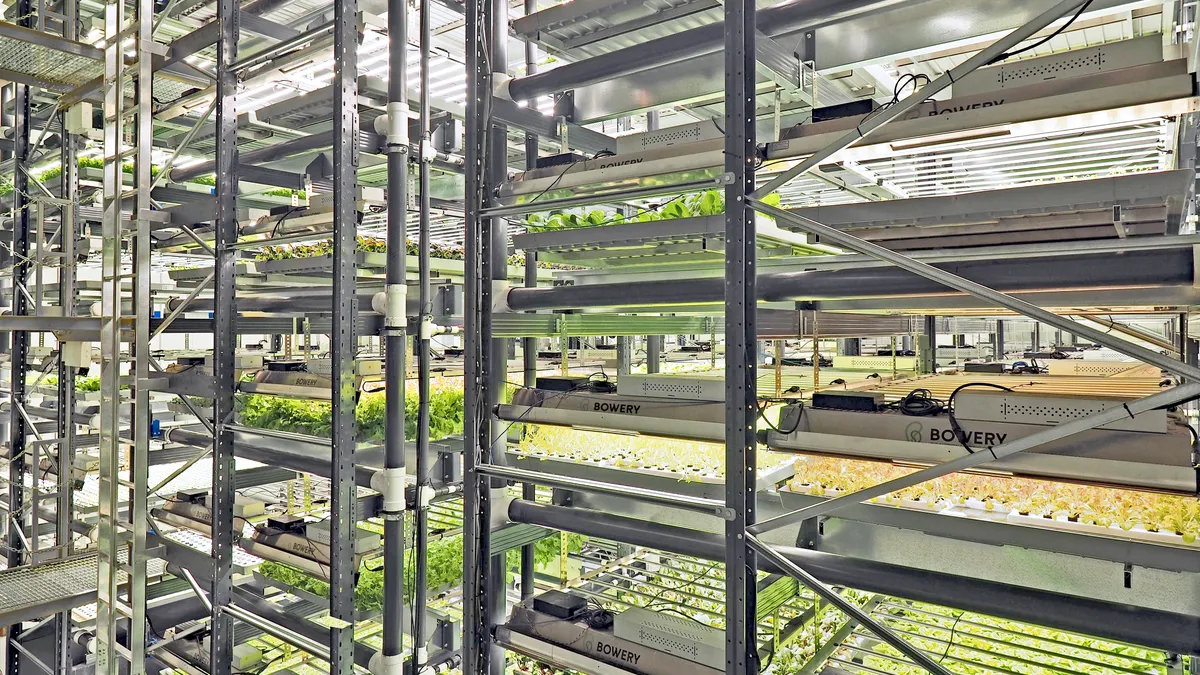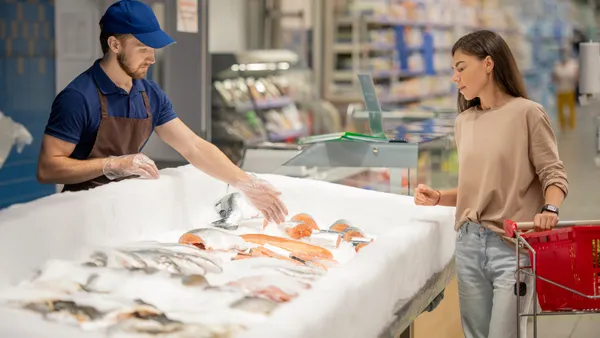Dive Brief:
-
Albertsons has expanded its selection of vertically farmed produce to 111 Safeway and 164 Acme stores on the East Coast.
-
All 275 stores have begun stocking four types of leafy greens from Bowery Farming, with two facings for each SKU available in produce departments, said Katie Seawell, Bowery’s chief commercial officer. The locations also sell Bowery’s packaged fresh basil, with merchandising that varies by location.
-
The announcement continues Albertsons’ focus on sourcing produce from indoor farms, including its deal with Plenty to bring leafy greens to 430 West Coast stores.
Dive Insight:
As grocery chains across the U.S. expand into vertically farmed leafy greens and herbs, Albertsons is focusing on large-scale deals to build out its assortment.
Last summer, the company announced its plans to add fresh kale, lettuce and arugula from Plenty to more than 400 locations across California. That rollout is happening gradually, with just over 50 stores now offering the greens, mostly in smaller communities where shoppers haven’t previously been able to buy vertically farmed greens. Meanwhile, the eight facings of leafy greens from Bowery Farming, including kale, butter lettuce and spring mix, along with the company’s fresh basil, are currently available at all 275 announced stores.
In a statement, Ricardo Dimarzio, produce sales manager of Albertsons' Mid-Atlantic Division, said the grocer is focused on omnichannel sales of fresh ingredients to help shoppers make meals at home.
Seawell said the pandemic boosted demand for fresh greens, while retailers have come to appreciate the year-round supply with a local and sustainable merchandising angle to it. Bowery currently operates farming facilities in Kearny, New Jersey, and in the Baltimore area, and will have another up and running in Bethlehem, Pennsylvania, by early next year.
The company currently sells greens in close to 800 grocery stores, including Walmart and Whole Foods Market, and to online retailers including Amazon Fresh. The Albertsons rollout is its largest grocery deal to date, said Seawell.
Vertical farms have struggled in years past with high energy costs and slim sales margins, but technological advancements have made the business more sustainable, said Seawell. Bowery’s facilities utilize a proprietary operating system that optimizes growing conditions, gathers data and learns better crop management practices over time. She said the cost of LED lighting has come down significantly in recent years, reducing operating costs.
Indoor farming is becoming an increasingly competitive business as companies scale up and compete for retail placement. Kroger recently expanded its distribution deal with 80 Acres Farms to more than 300 stores while BrightFarms supplies to hundreds of stores, including Ahold Delhaize’s banners on the East Coast. InFarm, the German tech firm, recently announced plans to place modular grow units in urban areas to supply fresh greens to local stores.
Seawell said Bowery is focused on building brand awareness on the front end and honing its growing technology on the back end. The company recently hired Injong Rhee, who previously served as a VP at Google and was chief technologist at Samsung Mobile, as its first chief technology officer.
With the addition of its Pennsylvania growing facility later this year, Bowery will be able to produce more than 5.5 tons of produce per day, or roughly 20 million clamshells per year. In addition, it’s looking beyond leafy greens and trying to grow various kinds of fruits and vegetables. At its New Jersey testing facility, Bowery has grown more than 100 different kinds of produce, said Seawell.
"We will be more efficient with each subsequent farm we bring online and plan on unlocking the untapped demand that's there in each market," Seawell said.













